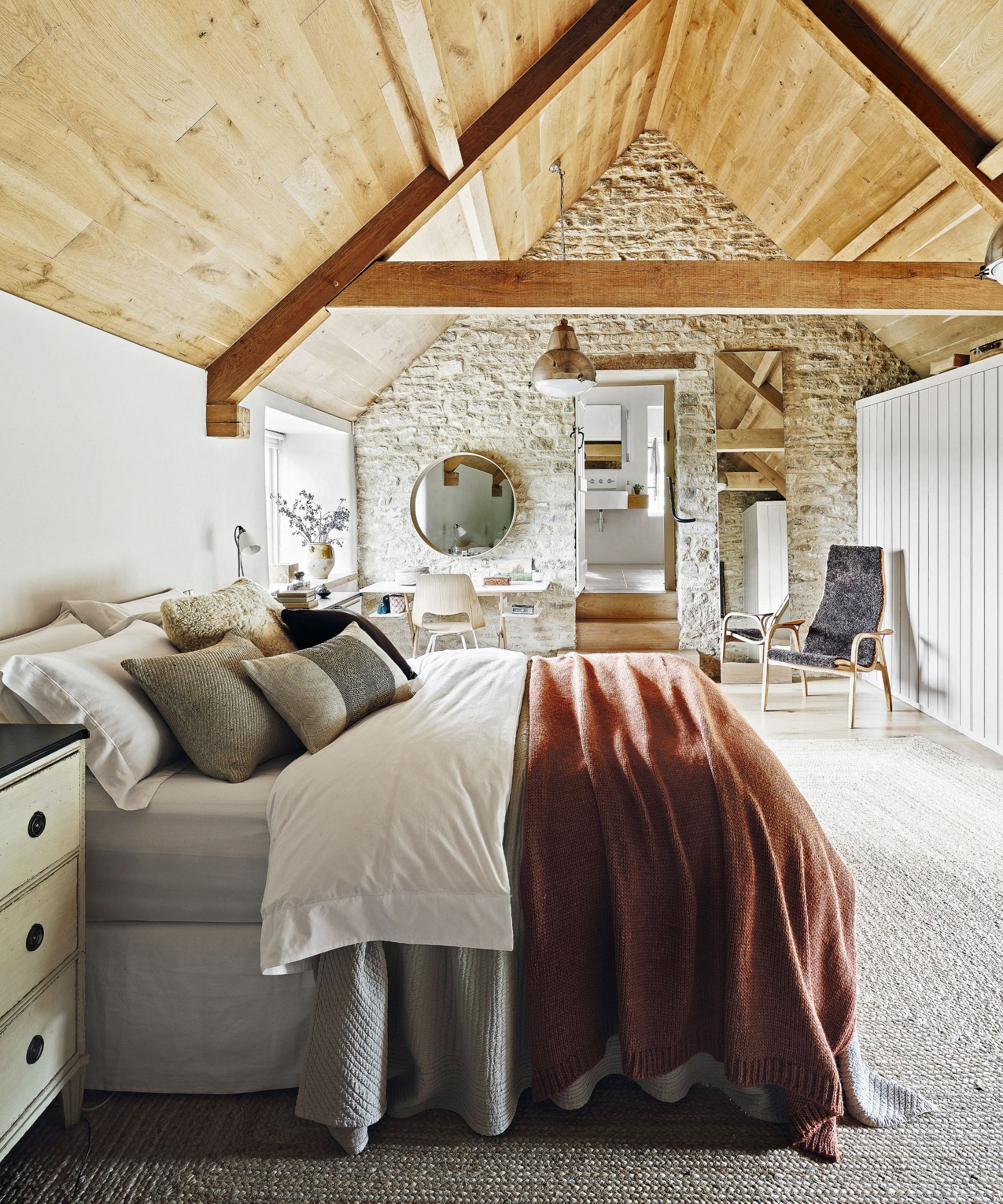
Sleeping at home can often be easy. You’ve picked one of the best mattresses for your sleeping style and set up your bedroom to be as sleep-friendly as possible. In short, you’ve designed a room that works for your sleeping style and schedule, to ensure you have the best possible chance of a good night’s rest.
But, of course, we can’t always sleep at home. Whether it’s a long-awaited holiday, a trip to see family or friends, or a necessary business trip, sleeping in strange beds from time to time is part of most people’s lives.
How to sleep well away from home
For some people, sleeping better when you’re away from home can be a real challenge, as Theresa Schnorbach, Sleep scientist from Emma - The Sleep Company explains, 'Being away from home can not only disrupt your sleep routine, but a new environment can bring with it many factors that can impact sleep such as the feel of new bedding, new smells and sounds, and differences in light and temperature.'
Sleeping badly away from home can also be linked to the ‘First Night Effect’. 'This is a well-researched phenomenon surrounding how the first night spent in an unfamiliar environment can generate negative changes in sleep patterns, such as a decrease in total sleep time, reduced REM sleep, and a low sleep efficiency,' says Theresa.
And, of course, if we’re venturing abroad, we might also be at the whim of jet lag. 'Jet lag occurs when our circadian rhythms or body clocks (our natural and internal sleep-wake cycle) are temporarily disrupted due to changing time zones- this is often more prevalent when traveling east,' explains Theresa. 'When our circadian rhythm falls out of sync with our new environment we can have headaches, stomach problems and difficulties falling asleep at night as well as daytime sleepiness.'
Fortunately, there are some simple tips you can employ to make sure that you do sleep well away from home and wake up refreshed and ready for the next day. Our sleep experts have picked their top tips below…
1. Shift your sleep schedule before you travel
If you’re traveling abroad, adjusting your schedule before you’ve even set foot on the plane can make a huge difference to how you’ll feel at the other end. 'If you know you’re crossing time zones, shift your bedtime and wake-up time gradually towards the schedule you’ll be on at your destination,' suggests Dr Mark Aloia, Head of Sleep and Behavioural Sciences, SleepIQ Health at Sleep Number.
'This is the same advice you’ll see around Daylight Saving Time (DST), where you are encouraged to shift your bedtime up in 15-minute increments each day, so you are not drastically changing your sleep schedule the day after time change. If your sleep schedule varies too much day-to-day, you may need to try to reel in your sleep routine with same or similar sleep and wake times, first. Wake time is the most important factor in setting your circadian rhythm. Finally, exercise at the right time and adjusting your meal schedule can help you adapt to the new time zone.'
2. Get plenty of sunshine and light during the day
It might seem counterintuitive, but getting plenty of sunshine during the day will help you to sleep far better when it finally comes time to get some shut-eye. 'One way to fight the effect of jet lag and re-synchronize your circadian rhythm is by exposing yourself to bright sunlight throughout the morning and day,' explains Theresa. 'Abroad or not, light is one of the major aspects that controls our circadian rhythm as a central circuit that is sensitive to light, called the suprachiasmatic nucleus (SCN), controls the production of the hormones that support us when we sleep and when we wake.'

3. Stick to your routine
Most of us will have some routines and schedules that we follow each evening to help us wind down for sleep. And keeping these up when you’re away from home is essential to helping you fall and stay asleep in a strange environment, as Dr Aloia explains, 'Consistency is key. Your sleep routine signals your body that it’s time for bed, and there are plenty of ways to promote sleep—such as reading a book, meditating, deep breathing, listening to calming music, and so forth. These techniques are also used to help manage stress for those who find travel to be stressful.'
'As mentioned, consistency is key so try to keep up with your regular pre-sleep activities even while you’re away from home. If exercise is in your daily routine, make sure you’re not getting too much physical stimulation too close to bedtime; instead, opt for light physical activities like walking or stretching in the evening. Avoid bright screens or harsh lighting before bedtime and try to use natural sunlight in the morning at your new destination to help re-set your internal clock.'
4. Create or bring something familiar
One of the easiest ways to help your body relax and prepare to sleep is by providing it with items and smells that are familiar to it. This will help your brain to wind down. 'The best advice is to pack items that make you feel most at home but won’t be a burden to carry around,' says Dr Aloia. 'For example, you could take your pillow, earplugs, eye mask or anything else that you normally use to sleep at night.'
Theresa agrees, 'Bringing something that reminds you of home, a partner, or even a pet, can help you feel at ease and therefore in a relaxed state ready for rest. A recent study also showed that sleeping with an object that smells like a loved one can increase sleep efficiency by more than 2% on average - an effect comparable to melatonin intake.'
Another tried and tested trick that we’d recommend is using a sleep spray for a couple of weeks before you travel at home, then packing this to use at your destination. This will help trick your brain into thinking you’re at home. Lavender and camomile are particularly effective!
If you want an upgrade from the free sleep mask you got on a flight, this weighted mask made of 100% silk guarantees a relaxing and luxurious sleep experience and is filled with lavender so gives the effects of a pillow spray too. Endorsed by the iconic likes of Oprah Winfrey and Venus Williams, the mask is a steal at $20.
If you are after a pillow mist that's not overly powerful, this has a lovely light scent. Sometimes pillow sprays can get so strong they can actually have a detrimental effect on your sleep. This one makes for a lovely linen spray too.
This is an iconic pillow spray that lots of people rave about. It's a mix of lavender and chamomile so really relaxing before bed. And there are a few different sizes on offer too so you can pick one that's travel appropriate.
5. Set up a conducive sleeping environment
Hotel rooms and friends’ houses can be hard to get to sleep in, particularly if the sleeping environment isn’t conducive to dozing off. Rooms that are too hot, too cold or just too brightly lit by exterior lights can all make it tricky to get comfortable, so Dr Aloia recommends these tips. 'Firstly, sleep in a cool environment (67 to 69 degrees) that is also dark and quiet. Secondly, make sure to dim the lights or use amber lighting, get the room as dark as possible (it helps if the hotel or rental property that you are staying at has blackout curtains).'
Obviously, these things can be easier to adjust if you’re in a hotel room rather than staying with a friend, hence why we’d always recommend carrying earplugs and an eye mask! But doing your best to create a sleep-friendly bedroom wherever you’re staying will make a huge difference to how you feel the next morning.

6. Watch what you eat and drink
It can be hard to eat sensibly when you’re away from home. Busy business trips don’t always leave a lot of time for eating, while holidays encourage us (and quite rightly so!) to indulge a little and enjoy ourselves food-wise.
But what we eat can influence our sleep, as Dr Aloia explains, 'Meals with excessive amounts of fat can lead to abnormal sleep breathing patterns, affect stages of sleep and lead to daytime sleepiness. Sugar, substances like caffeine, chocolate and alcohol can all affect sleep.'
'Stimulants such as caffeine can delay sleep onset and reduce total sleep time. Did you know that caffeine can stay in your system for 10 hours? Substances such as alcohol can promote sleep onset but have a negative effect on sleep architecture and sleep cycles in the middle of the night. My recommendation, regardless of travel, is to stay hydrated with water and limit anything that could dehydrate or overstimulate your body.'
7. Avoid lengthy naps
It can be really tempting to just take a long nap when you arrive at your destination, but this is best avoided. If you need a nap, make it snappy, as Dr Aloia explains, 'Aim for short naps (20-30 minutes long) to help adjust to a new time zone or recover from sleep debt. You may want to avoid long naps because it can make it harder to adjust to a local schedule. You should also remember that naps too close to bedtime could disrupt your sleep.'
If you’ve traveled to a different time zone, it’s important to try and adjust to the local time as quickly as possible, following some of the tips in this guide. When it is time for bed, follow these six simple tips to ensure you fall asleep as quickly as possible.
There are few things more frustrating than not being able to sleep, and the knock-on effects on our health and enjoyment can be manifold. That’s why being able to get to sleep wherever you are is so important. And the key is to strike a healthy balance between fun and sleep, as Theresa explains, 'As well as changes to routine, being away from home may mean you’re also doing something exciting like going on holiday, attending a wedding, or similar. While it's important to enjoy yourself, you also need to look after your sleeping pattern and, where possible, prioritize getting the 7-9 hours recommended by the National Sleep Foundation.'







